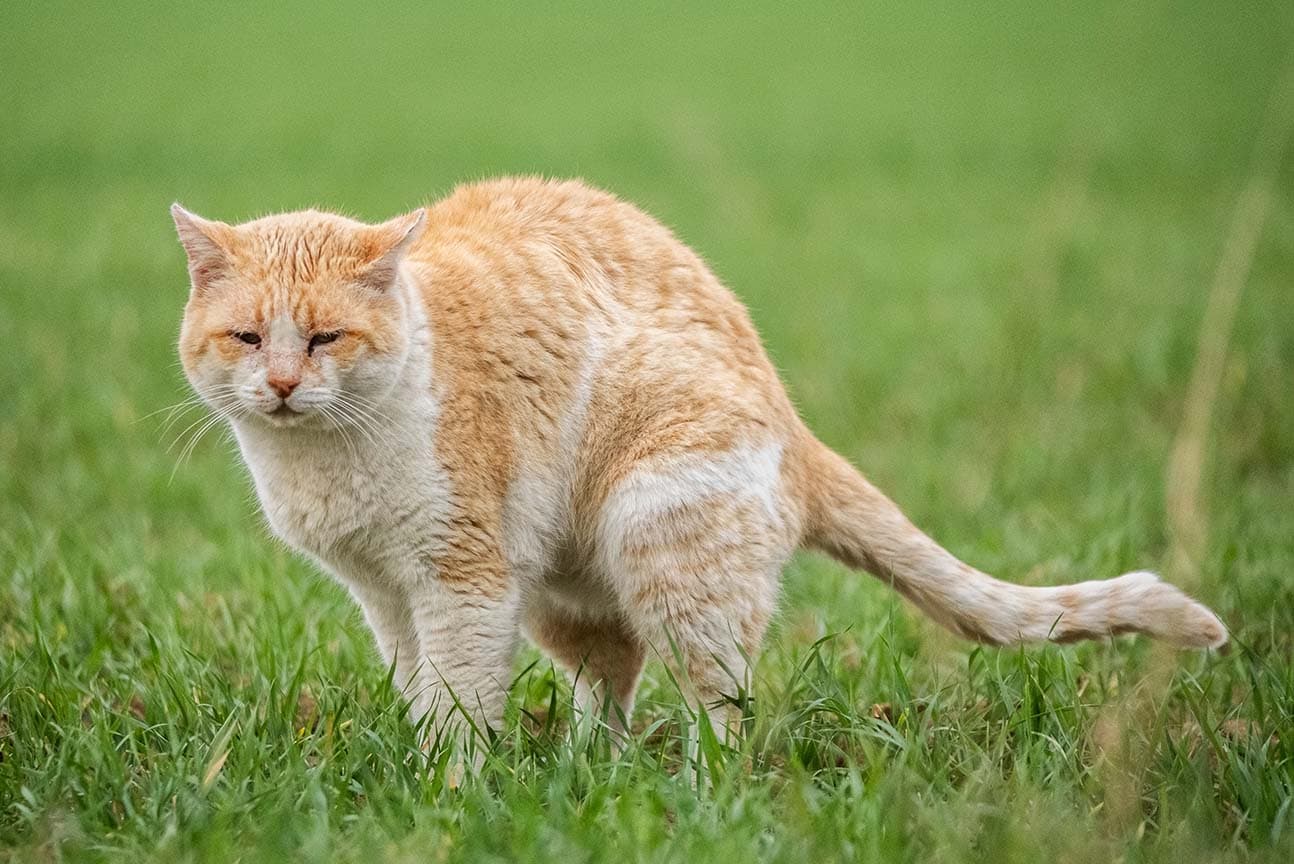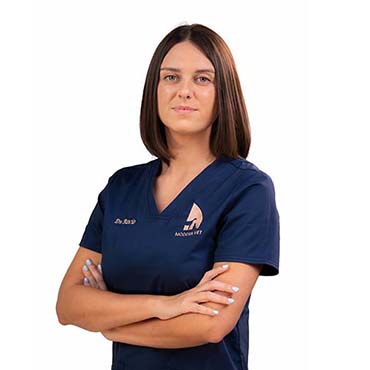Reviewed by Dr. Rocio Mena
Updated on 25/09/2025
Reading time 4 min.
Overview
Severity: Low
Life stage: All
Diarrhoea is a common problem in cats of all ages, causing loose, watery stools and more frequent trips to the litter tray. Cats with diarrhoea often remain bright and alert, continuing to eat and drink normally.
Most episodes of diarrhoea clear up within 24-48 hours, either by themselves or with simple changes in the diet. But diarrhoea can also be a sign of major illness, and cats with severe diarrhoea can quickly become dangerously dehydrated in Dubai’s extreme climate. Knowing the causes, warning signs, when it’s safe to treat at home and when to call a vet enables you to manage your cat’s diarrhoea with confidence.
What to do if your cat has diarrhoea
If your cat is otherwise well:
- Offer small amounts of bland, easy-to-digest food every 2-3 hours
- Plain boiled chicken or white fish works well for most cats
- Ensure fresh, cool water is always available, especially in Dubai’s climate
- Keep your cat in air-conditioned areas to prevent additional stress
If your cat has both diarrhoea and vomiting:
- Withhold food for the first few hours
- Focus on keeping them hydrated with small sips of filtered or bottled water
- Contact your vet if symptoms continue for more than 12 hours
Important for Dubai Cat Owners: Indoor cats often become stressed by changes in routine, which may worsen digestive upset. Try to minimise changes to their environment and feeding schedule as much as possible.
Common causes of diarrhoea in cats
Understanding the possible causes helps you and your vet to identify problems promptly and treat diarrhoea effectively.
Diet-related:
- Switching between different imported brands of cat food
- Dietary indiscretions: eating a poor-quality diet or spoiled food, eating human food leftovers, or new treats
- Changes in feeding routine during holidays or Ramadan
Indoor environment factors:
- Harmful houseplants: many popular Dubai indoor plants can upset your cat’s stomach
- Household chemicals: residue of disinfectants on surfaces used by cats
- Stress from lifestyle and household causes: confinement, lack of opportunity to express normal behaviours, overcrowding, bullying from other cats, household changes, new furniture, and home DIY
Health-related causes:
- Food allergies and intolerances: adverse reactions to particular ingredients in commercial cat foods
- Infections: viruses (panleukopenia, coronavirus), bacteria (campylobacter, salmonella), protozoa (Giardia)
- Worms: even indoor cats can get worms from insects or contaminated items, usually roundworms
- Blocked intestines: from hairballs, toys, or string they’ve played with (common in bored indoor cats)
- Having a chronic illness: diabetes, kidney disease, hyperthyroidism, inflammatory bowel disease, pancreatitis, cancer
Dubai-Specific Considerations:
- Water quality changes when switching between tap and bottled water
- Stress caused by moving home (common in Dubai’s expat community)
- Extreme variability in temperatures when moving between air-conditioned and outdoor areas
When to worry about your cat’s diarrhoea
While most diarrhoea episodes are manageable at home, certain signs require prompt veterinary attention.
Contact a vet immediately if your cat:
- Has both severe watery diarrhoea and is vomiting
- Stops eating and/or drinking for more than 12 hours
- Becomes unusually sleepy or unresponsive
- Has blood in the stools
- Is straining constantly but producing little stool
Schedule a vet visit within 24 hours if your cat:
- Has loose stools for more than 48 hours
- Seems uncomfortable or in pain
- Has worms visible in their stools
- Is an elderly cat (over 10 years) or a kitten under 4 months old
- Has another chronic illness
Top Vet Tip for Dubai Pet Owners: Take a fresh stool sample in a clean container when you visit your vet. Many Dubai clinics can run quick tests to identify some causes of diarrhoea and analyse them in a laboratory to identify others.
How to reduce the risk of your cat getting diarrhoea
Prevention is always better than treatment, especially in a hot climate with additional risks.
Dietary Management:
- Feed your cat a complete, high-quality cat food appropriate to their age and lifestyle
- Make any food changes gradually over 7-10 days
- Store food properly to prevent spoilage in Dubai’s heat and humidity
- Avoid giving human food, no matter how much they insist!
Indoor Environment Safety:
- Keep your house clear of the toxic houseplants common in Dubai homes, including lilies and sago palms
- Store cleaning products in secure containers and rinse surfaces thoroughly after use
- Provide durable, engaging toys without small parts that could be swallowed
- Keep air conditioning at consistent levels throughout the house to reduce stress
General Healthcare:
- Keep up-to-date with regular worming: every 3-4 months for indoor cats
- Schedule yearly health checks with your vet, 6-monthly for older cats
- Follow your Dubai-based vet’s advice for vaccinations: expert, local, and reliable
- Groom your cat regularly to remove loose hair and prevent hairballs
What diarrhoea looks like in cats
Recognising different types of loose stools helps you describe the problem to your vet.
Mild Cases:
- Soft, formed stools that hold their shape
- Slightly more frequent toilet visits
- Your cat remains bright and alert
More serious cases:
- Watery, liquid stools
- Unusual colours: bright yellow, very dark or containing blood
- Stools with mucus: a slimy, grey coating, like a ‘skin’ on the stool
- Strong, unusual smells
Warning signs:
- Fresh blood mixed through the stool
- Black, tar-like appearance
- Straining with little stool produced
- Accidents outside the litter tray: unusual for most cats
Behavioural changes suggesting discomfort or pain:
- Walking with a hunched back
- Crying when picked up
- Reluctance to move or play
- Gurgling stomach sounds
- Becoming aggressive or withdrawn
How to treat a cat with diarrhoea at home
Home care can be very effective for mild diarrhoea in cats who are otherwise well.
Feeding protocol:
- Days 1-3: Offer small meals (1-2 tablespoons) of light, low-fat food every 2-3 hours
- Best options: Plain boiled chicken, white fish, or scrambled egg
- Prescription diets: Available from Dubai pet stores and vet clinics
- Portion control: Don’t overwhelm their digestive system
Food needs to be easily digested and given in small quantities to ensure it’s fully suggested and absorbed, leaving little waste to aggravate diarrhoea.
Fluid support:
- Ensure your cat has fresh filtered or bottled water available at all times
- Room temperature water works best
- Tuna water (from tins in spring water) can encourage drinking
- Special rehydration solutions for pets may be available from your vet
Additional Support:
- Probiotic pastes help to firm up loose stools and restore gut health
- Continue probiotics for at least 5-7 days
- Keep your cat comfortable in air-conditioned areas
- Maintain their usual routine as much as possible
Returning to a normal diet:
- Once your cat’s stools return to normal consistency, gradually reintroduce their regular food over 4-5 days. This slow transition helps prevent relapse.
Veterinary treatment for diarrhoea in cats
Where home treatment is inappropriate or unsuccessful, your vet may advise further tests to find and treat an underlying cause.
Diagnostic process:
Your vet will begin by asking detailed questions about your cat’s diarrhoea (duration, description), any changes in diet, behaviour or appetite, and any other health concerns.
Further tests:
- Stool sample analysis to check for worms and other parasites or bacteria
- Blood tests to check overall health and hydration
- Imaging: X-rays and/or ultrasound scan
- Specific blood tests, biopsies, or specialist referral for more complex cases
Treatment options:
- Medication to treat specific causes, such as antibiotics or wormers
- Fluid therapy, to treat or prevent dehydration, is important in Dubai’s climate
- Special prescription diets: long-term management for food allergies or specific health conditions
- Surgery: occasionally required to remove blockages or an abdominal growth
Are some cats more at risk of diarrhoea?
General factors:
- Kittens: more susceptible to infections and worms; likely to eat or swallow things they shouldn’t
- Elderly cats: poorer digestion with advancing age and a greater likelihood of chronic illnesses
- Cats with outdoors access: potential exposure to plants, insects, or hunting small prey
- Long-haired breeds: More prone to hairball-related blockages
- Cats who have not been vaccinated or wormed regularly
- Cats living in multi-cat households: infections can spread between them
Factors significant in Dubai
- Recently-relocated cats: May struggle to adapt to a new and very different environment
- Cats fed raw or wet food diets: Greater risk of food spoilage in hot, humid conditions
Are you worried about your cat with diarrhoea or digestive issues? Don’t wait – book a checkup or emergency appointment today at Modern Vet Hospital in Dubai. Our experienced veterinary team provides comprehensive diagnostic services, emergency treatment, and ongoing care specifically tailored to feline digestive health. From identifying underlying causes to providing effective treatment plans, Modern Vet Hospital is your trusted veterinary clinic in Dubai for thorough, compassionate care when your cat needs it most.
Share this, choose your platform!
Reviewed by
Dr. Rocio Mena
DVM
Dr. Rocio Mena was born in Spain and discovered her passion for veterinary medicine early in life. She pursued this dream and graduated from CEU University in Spain in 2018 with a degree in…


